Sustainable teaching
Healthy cows are more sustainable
If you have a fever, you do less. This also applies to the cow. Two students of veterinary medicine showed in their work as part of "Sustainability in Teaching" that cows suffering from udder infections give less milk and put more pressure on the climate.
St. Bernard, marmot – or rather the cow? Switzerland does not have an official national animal, but the horned cattle would have a good chance of reaching the top podium. But the image of happy cows, tasty cheese and satisfied consumers has been tarnished in recent years. In Switzerland, for example, cows are responsible for half of the climate-damaging methane emitted by agriculture. And the fact that the vast majority of male calves and some of the female calves have to go to the slaughterhouse after just four to six months raises ethical questions.
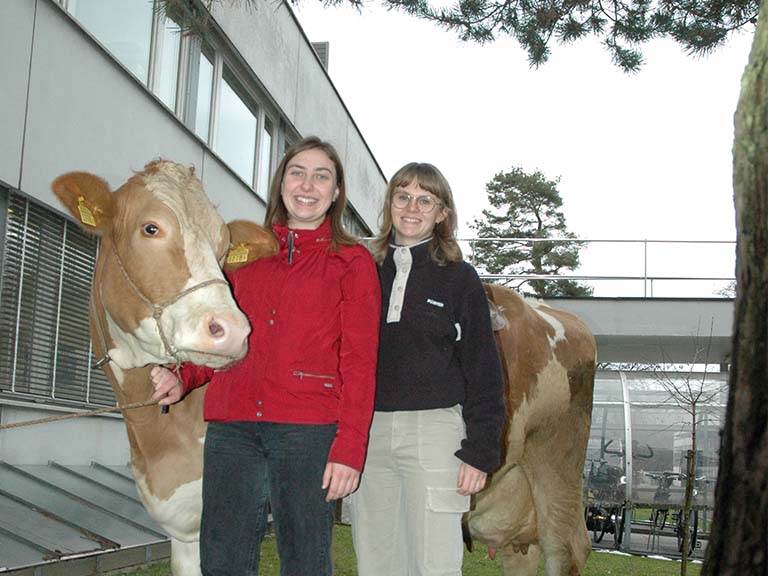
Antibiotic resistance, loss of earnings, climate change
Justine Maillard and Lorine Droux, students of veterinary medicine at the University of Bern and now in their third semester, addressed in their very first semester thesis how these excesses of modern milk production could be somewhat alleviated. Their approach was the infectious disease mastitis, which is common in cows. The special feature of the thesis "An Overview of Three Aspects of Sustainability in Udder Inflammation in Dairy Cows", which was developed as part of "Sustainability in Education" (see info box below) is that it not only focuses on the disease and its prevention, but also addresses how the reduction of diseases has a positive impact on ecological, social and economic contexts.
Sustainability in all degree programs: Series in uniAKTUELL
All students of the University of Bern should start thinking seriously about sustainability during their studies. The University of Bern therefore integrates sustainable development into the teaching of all faculties and fields of study and supports lecturers in designing appropriate courses. uniAKTUELL presents concrete examples in an informal series.
Art History: Students show solutions for sustainable building (in German)
Linguistics: Let’s talk about waste! (in German)
“It takes the courage to strike out in new directions” (in German)
The effect on the economic dimension of sustainability is obvious: milk from cows with mastitis that are given antibiotics cannot be consumed but must be disposed of. For the farm, this means loss of income and disposal costs. However, these antibiotics also have a negative effect on society: more and more pathogens are developing resistance to these pharmaceuticals. This makes antibiotic treatment difficult not only for farm animals, but also for humans. Finally, a sick cow pollutes the climate more than a healthy one, because it does not produce usable milk for several days, but nevertheless eats, digests and emits methane as usual. In addition, its milk production decreases due to disease. Per tonne of drinking milk, it therefore contributes more to global warming.
A lesson in scientific writing
For the two students, the work has yielded some new insights. "We searched specialist databases for studies that show how to avoid prescribing antibiotics as much as possible", explains Justine Maillard. Part of the work, which was limited to four printed pages, includes solutions such as strict hygiene in the barn during milking, sufficient bedding or the separation of infected animals.
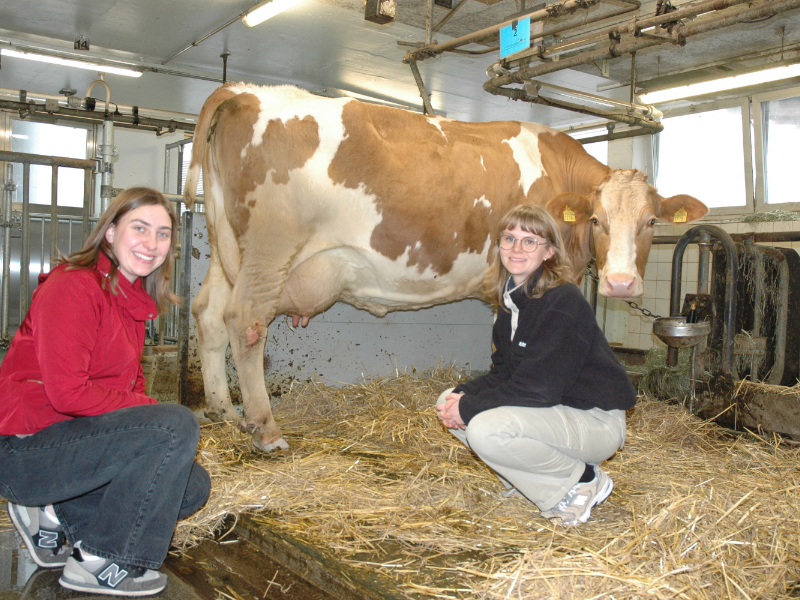
In addition to the consequences for animals, the environment and business accounting, the two have also learned to research systematically, to separate the information chaff from the wheat, and to organise the collected data in a meaningful way and put it on paper. Her mentor Jens Becker, for example, taught them that it is not enough for a scientific paper to be beautifully formulated and as attractive as possible to read, as it may sometimes be in high school. "We had to revise a number of things, consolidate the information and always use the same term for the same subject matter,“ Lorine recalls. It was also time-consuming to adapt the structure so that the work had a logical structure and to derive the conclusions correctly from the facts.
More environmentally and animal-friendly farming
In fact, the paper was well suited to "learning how to write such a paper technically correct and yet comprehensible,“ explains Becker. The research associate at the Department of Clinical Veterinary Medicine at the University of Bern volunteered to be a mentor in autumn 2022 because sustainable development is an important topic for him personally. "Most of us consume cottage cheese and parmesan. But few people are aware that milk production is involved in animal welfare and climate change in many ways."
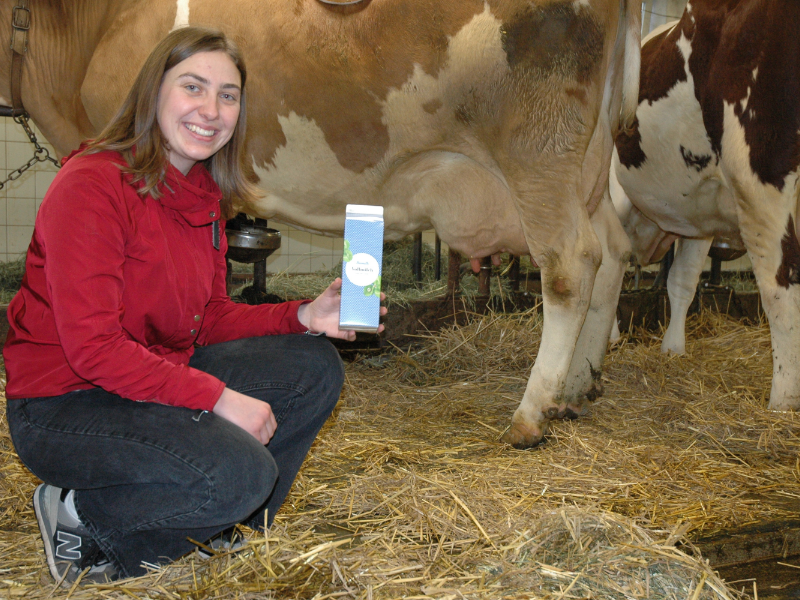
During his own studies, these aspects were not concealed from him, but they were not actively taught either. "At the Vetsuisse Faculty, we contribute to sustainability by researching how agriculture can produce in a more environmentally and animal-friendly way."
A faculty learns sustainability
The course under the motto "A faculty learns", which has taken place three times so far, is coordinated by Irene Adrian-Kalchhauser . The professor at the Institute of Fish and Wildlife Health starts each time with an information event: "This is where we introduce the topic of sustainability scientifically, clarify terminology and spread ideas. The students are then free to choose the topic for their project work." Adrian-Kalchhauser asks the faculty who is available as a mentor. She then assigns the students to a suitable person from the teaching staff for the chosen topic.
Topic arouses great interest
The two students are still fascinated by the subject today and have also aroused great interest among their friends and family. "It is quite possible that I will study an aspect of mastitis in more depth in my master's thesis,“ says Lorine Droux. It was no coincidence that she and Justine Maillard teamed up in tandem for group work: "We live together in Bern, study the same subject, are both passionate horse riders – and come from the French-speaking part of Switzerland, which of course makes linguistic collaboration easier." After their training, Lorine and Justine want to work with big animals, with horses or cows. And both grew up with cats. Justine: "When we have learned something new in anatomy, I occasionally examine her – but she doesn't like it very much."
Promotion of sustainable development in teaching
Lecturers and intermediate staff at the University of Bern can apply for resources through the FNE (Promoting Sustainable Development in Teaching) funding mechanism in order to develop courses relevant to sustainability at the University of Bern. Particularly, the specific topics of the degree program are to be linked to issues of sustainable development, sustainability-relevant competencies are to be promoted, and a process of reflection on the values of discipline and sustainable development is to be initiated. The FNE funding is part of the “Education for Sustainable Development (ESD)” project of the University of Bern. This project supports the Vice-Rectorate Quality in integrating sustainable development (SD) more strongly into teaching at the University. It highlights various disciplinary and interdisciplinary links with sustainable development and supports the faculties and institutes in strengthening these links and making them visible to the outside world. In addition to the FNE, various support offers such as working materials and services are announced by the ESD team of the Centre for Development and Environment (CDE).
“It takes the courage to strike out in new directions”
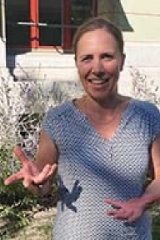
The University of Bern, Bern University of Applied Sciences, Bern University of Teacher Education and the University of Teacher Education NMS want to work together to strengthen "Education for Sustainable Development": students should be able to understand and tackle complex problems of the present and future. Lilian Trechsel explains what is already working well and what still needs to be done.
Art History: Students show solutions for sustainable building
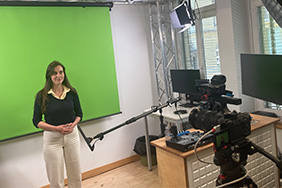
What do architecture and design have to do with the environment? In a practical seminar, students explore cultures of sustainability. They make their findings accessible to a wide audience with video presentations. A workshop visit.
Linguistics:Let’s talk about waste!
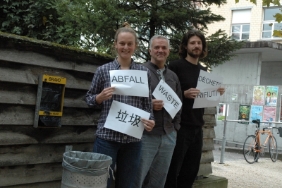
We are confronted with waste every day. At the same time, the way we deal with waste is fraught with taboos, fears and prejudices. Doctoral students at the University of Bern are investigating our peculiar relationship with these unloved leftovers - and providing a topic for discussion.